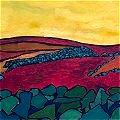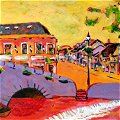‘Craic’ or ‘Crack’: Is it Irish?
In my post on Fun in America and elsewhere I’ve referred to ‘Craic’ being an English term that was then Gaelicized, and Conor has said that he’s interested in my sources for saying this.
Mostly I say what I do regarding the term “craic” based on memory of what I witnessed happening in Ireland and on what I’ve read over time.
I recall in Dublin “crack” being the spelling that was used exclusively in the mid-1970s, and then watched it begin to appear in the Gaelic style spelling “craic”.
Barney Rush wrote the song The crack was 90 in the Isle of Man in the 1960s and in my copy of The Christy Moore Songbook published by Brandon Books in 1984, “crack” is the spelling used.
I used to watch an Irish language programme on television, on RTE, called SBB ina Shuí and SBB himself, Seán Bán Breathnach, used to frequently say Beidh ceol, caint agus crack/craic againn (”We’ll have music, talk and crack”) but of course you don’t speak in spelling.
That was however when I first noticed a possible need to write down the word in Irish, and it started to appear on pub walls as “craic” most frequently as Ól, Ceol agus Craic (”Drink, Music and Crack”).
As I remember it, the 1970s were gas, and sometimes they were gas altogether, but in the early 1980s it was gas crack we were having - fueled by a gas man here and a gas woman there. Eventually we were to have just craic, though it could be mighty as well as 90 (even if I have suggested that number should be updated to 174).
Caomhín MacAoidh, a musician from Donegal is quoted as saying of ‘craic’:
A modern-Gaelic, commercially exploited spelling of the English word ‘crack’, most typically found on Irish-bar posters linked by the word ‘agus’ to the word ‘ceol’, this indicating commercialisation of traditional music as a device in selling ‘ol’.
I’ve read something similar in the excellent book, Last Night’s Fun: In and Out of Time with Irish Music by Ciaran Carson, another Ulster musician:
Which brings us to the famous ‘crack’, popularly and recently Gaelicised as ‘craic’ and advertised in countless retro-renovated bars throughout the land, as in ‘Live Ceol, Sandwiches and Craic’.
Non-Irish speakers in particular will insist on its ancient Gaelic lineage and will laboriously enunciate this shibboleth to foreigners who take it for a pharmacological rather than a social high. In fact, the Oxford English Dictionary dates crack, ‘chat, talk of the news’, to 1450. ‘Cracker’ is ‘one who or that which cracks, esp. a boaster, a liar’, reminding me of the Fermanagh use of ‘lie’, meaning an impressively convincing tall story, or wind-up. As the late Eddie Duffy, flute-player and cracker, would say. ‘The trouble with the young ones nowadays, they can play none, they can sing none, they can dance none, and they can tell no lies.’ In Belfast dialect, a cracker is a thing which is the best of its kind, a superlative.
Fintan Vallely, also a musician from Ulster (bio), has a very highly regarded book called the Companion to Irish Traditional Music - and its entry for “craic” has:
“Objection to the use of this spelling does not occur when it is used in writing in the Irish language, but it causes reaction when it appears as a ‘borrowed’ word in written English, because it is in fact originally an Old-English word which has been borrowed by the Irish language, and deductively translated (1977, Ó Dónaill) into Irish.
The word ‘crack’ is in everyday use in Ulster, Scotland, England and the USA, and would appear to have become widespreadly popular in the southern part of Ireland only since the 1970s, where up until then the term ‘geas’ was the popular word for the same concept.
The spelling ‘craic’ does not appear in Gaelic dictionaries until 1977; its converse does not appear in the 1904 Lane’s or the 1959 de Bháldraithe English-Irish dictionaries. The spelling ‘craic’ is presumably deduced from the old Irish word ‘craicaire’ (jester, talker, Dineen 1927) but - controversially - slenderises its sound.
It may also be linked, deductively, to the modern word ‘craceáil’ (to drive crazy), but only by mischieveous extrapolation to ‘cráic’ (the actual pronunciation in Belfast where the word is most popular) which in fact means ‘buttock’ or ‘anus’.
‘Crac’ (conversation) is given in the modern Scots Gaelic dictinary (MacLennan, 1979) but not the inverse; ‘cracairheas’ in the 1900 MacAlpine Scots Gaelic dictionary.
Fintan himself is quoted on Wikipedia on the subject:
[T]he spelling craic causes serious nausea among intelligent people. This glib spelling of the word was invented in the 1970s … it is the context of the use of the (recent, modern) Irish spelling of the word that is the issue - if craic is to be used, it should be used while writing in the Irish language, OR placed in parentheses or in italics when writing in English. I stress that this is a word which was NEVER in the Irish language (but cráic, meaning arsehole, or creac, meaning herd, are). … I grew up using the word in the 1950s. When I went to Dublin (from Ulster) in 1968 NOBODY I met in Dublin used ‘crack’ … ‘Crack’ only began to be used with the influx of northerners and in the context of music, it travelled with northern influence (at the fleadh cheoil, etc) until southern people began to believe that they had invented it. Ciaran Carson is particular enraged by the craic spelling, so too Desi Wilkinson and many other otherwise tolerant souls.
You can read the full text of Fintan’s comments on craic HERE
It was always my understanding that the word is English. It is a part of the very old Northeast English dialect spoken by Geordies you hear in Tyneside where a magazine called The Crack exists. There it means ‘conversation’, or ‘gossip’ which is how it is used in Ireland when you ask “What’s the crack?”.
The British Library defines the Geordie word “crack” as:
probably derived from the Anglo-Saxon verb cracian (cf. modern German krachen) - from which we get Standard English expressions, such as to crack a joke and wisecrack
My belief is that the word “crack” went from England to Scotland, across to Ireland with the Ulster Scots, spread amongst the music community of Ulster and then down to the rest of Ireland where it was then Gaelicized, commodified and exported.
Update: Since I posted this, the entry on Wikipedia was substantially updated and then simplified into a page on “crack (craic)” that now looks quite similar to much of what I’ve written here.
NOTE: All the Irish language words in this post can be looked up in my Irish Language Glossary
NÓTA EILE: This article has also been published in the Midwest Irish Focus
See Similar Nonsense:
• Irish Fests and the Definite Article
• History of an Irish Pub
• I’m Reminded of the British Police by Valentine’s Day in the USA
• End Times
• My Favourite Irish Saying

 Eolaí gan Fhéile:
Eolaí gan Fhéile:











Would you have similar opinions on the origins of the Irish word ‘cac’? As in “ag caint cac”!
Excellent research, Eolai.
You’ve got the facts laid out properly.
I remember back in 1963 in O’Donoghues pub in Dublin(Merrion Row) when the Dubliners were starting out after the Clancy Brothers and Tommy Makem(R.I.P. recently buried in Dover New Hampshire last Thursday) had Put the Songs back into the mouths of a generation of Irish People who had almost forgotten them. The Crowd that frequented the Pub at that Time used the Word “Crack” or Craic” a lot. The Word was also used in the ballad ‘The Work of the Weaver” i.e. We;re gathered here together for to sit and to crack, with our Glasses in Our hands and our work upon our Back, There’s nay a one among who could sing or could crack, if it was not for the Work of the Weaver. An Scottish Ballad I must add. I hope this information is helpful. Mise Le Meas Liam
Best research I’ve read on this yet. I have had too many people attribute everyhing to the “old ways” …etc…without much to back it up.
Being from the US I only ever heard “craic” from my Irish friends back in the day….and they did get into the occasional bit of misunderstanding as the crack epidemic was sweeping New York at the time. Which was funny, I have to admit.
Of course I did hassle them to “speak English” Who knew that they were?
Who knew that they were?
Cracker is a bit different in usage in the US as well.
Thanks.
[…] ‘Craic’ or ‘Crack’: Is it Irish? – Irish KC […]